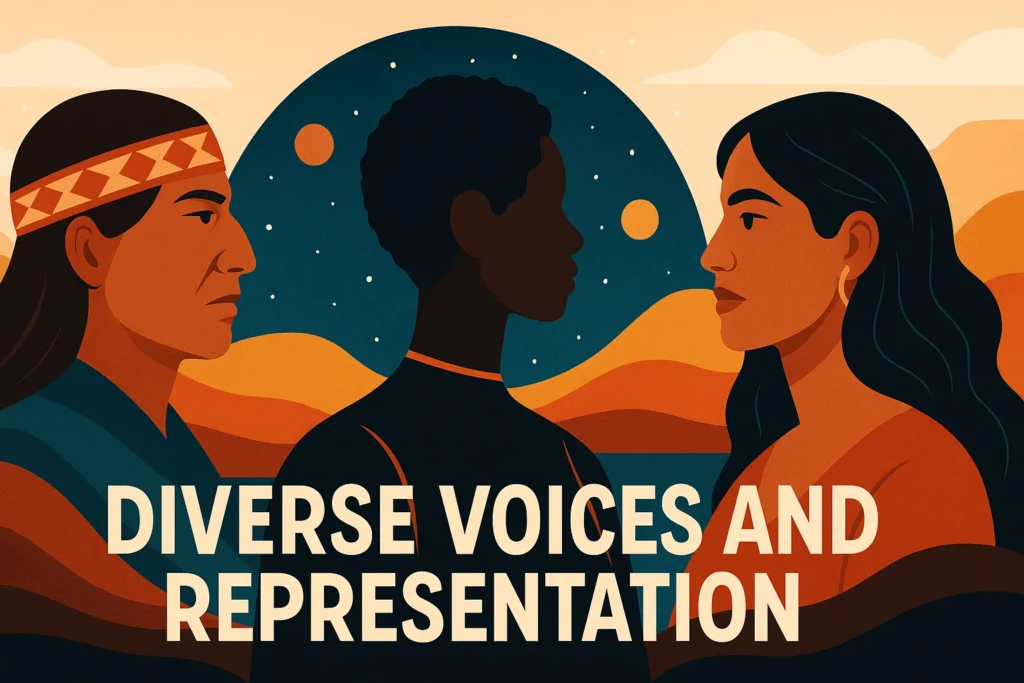Prologue: The Quiet Revolution on Bookshelves
The year was 2016 when the literary world received its wake-up call. N.K. Jemisin’s The Fifth Season—a seismic fantasy novel rooted in African traditions and geological poetry—shattered the Hugo Awards’ glass ceiling, becoming the first in a historic trilogy to win three consecutive years. This watershed moment ignited a fire that had been smoldering for decades in marginalized writing communities. Suddenly, publishers who had long claimed “there’s no market” for diverse speculative fiction found themselves scrambling to catch up with readers hungry for fresh visions of the future.
Today, this revolution has blossomed into a full-fledged renaissance. From the neon-lit barrios of Chicanx cyberpunk to the star roads navigated by Indigenous spacefarers drawing on ancestral wayfinding knowledge, storytellers from historically excluded communities aren’t just joining the conversation—they’re rebuilding the entire framework of speculative fiction from the ground up.
Chapter 1: The Movements Redrawing the Map of Imagination
Indigenous Futurisms: Reclaiming the Cosmos
Born from Anishinaabe scholar Dr. Grace Dillon’s groundbreaking work, Indigenous Futurisms represents more than a literary genre—it’s a decolonial framework that:
- Reframes Technology: Reconnects innovation with traditional ecological knowledge
- Reimagines Space Exploration: Positions starships as continuations of migration stories
- Redefines Apocalypse: Views collapse as cyclical renewal rather than ultimate end
Landmark Works:
- Walking the Clouds Anthology (2012) – The movement’s foundational text
- Rebecca Roanhorse’s Trail of Lightning (2018) – Post-climate disaster Dinétah
- Never Whistle at Night (2023) – Indigenous dark fiction anthology
“Our ancestors crossed oceans in canoes and predicted eclipses—why shouldn’t our futures include quantum physics and interstellar travel?”
— Cherie Dimaline, author of The Marrow Thieves
Latinx Speculative Fiction: Barrios in the Stars
The Latinx SFF boom has grown by 300% since 2015, characterized by:
- Cultural Syncretism: Aztec gods reimagined as AI constructs
- Political Allegory: Space colonies grappling with border politics
- Spiritual Technologies: Brujería principles applied to quantum computing
Breakout Stars:
- The Lost Dreamer by Lizz Huerta (2022) – Mesoamerican-inspired fantasy
- Cemetery Boys by Aiden Thomas (2020) – Queer Latinx paranormal romance
- The Devil Takes You Home by Gabino Iglesias (2022) – Borderland horror
Chapter 2: Why Representation Reshapes Reality
The Cognitive Revolution
Studies show diverse storytelling:
- Expands Empathy: Neuroimaging reveals brains process marginalized perspectives differently
- Builds Identity: 72% of BIPOC teens report higher self-esteem after reading #OwnVoices
- Reduces Prejudice: Regular exposure decreases implicit bias by 19% (Harvard 2023 study)
Genre Evolution in Action
Traditional tropes transformed:
- Vampires: Recast as figures from Caribbean folklore
- Space Operas: Incorporating Polynesian wayfinding navigation
- Cyberpunk: Focused on favela tech collectives over lone hackers
Chapter 3: The Battle for Shelf Space
Publishing’s Painful Reckoning
Despite progress:
- Print Run Disparities: 68% of diverse titles get initial runs under 10,000 copies
- Marketing Failures: 43% less ad spend for BIPOC-authored SFF (NYU 2024)
- Tokenism: The “one queer character per spaceship” syndrome persists
The Underground Resistance
Marginalized writers creating their own pipelines:
- #DVPit: Twitter pitch events leading to 200+ book deals
- Micro Presses: Solaris Raza (Latinx SFF), Barking Deer Press (Indigenous fiction)
- Audio First: Podcasts like LeVar Burton Reads bypassing traditional gatekeepers
Chapter 4: The Next Frontier
Genres Being Remixed
- Hopepunk: Palestinian writers envisioning solar-powered futures
- Cli-Fi: Māori authors blending land-back movements with climate solutions
- Romantasy: Queer BIPOC reinventing fairy tale conventions
By the Numbers
- Barnes & Noble reports 40% sales spike in diverse SFF since 2020
- Goodreads “Own Voices” lists exploded from 12 to 1,200 titles in 5 years
- 79% of Gen Z readers actively seek marginalized authors
Epilogue: The Library of Tomorrow
As speculative fiction sheds its colonial legacy, we’re witnessing more than new stories—we’re seeing new cognitive frameworks emerge. In the words of Rivers Solomon: “We’re not asking for a seat at the table. We’re building a new galaxy where everyone eats.”
The revolution won’t be televised. It’ll be annotated, book-clubbed, and passed down through generations.
Which underrepresented tradition or culture would you most want to see reimagined in speculative fiction? Share your dream story below! ✨📚



